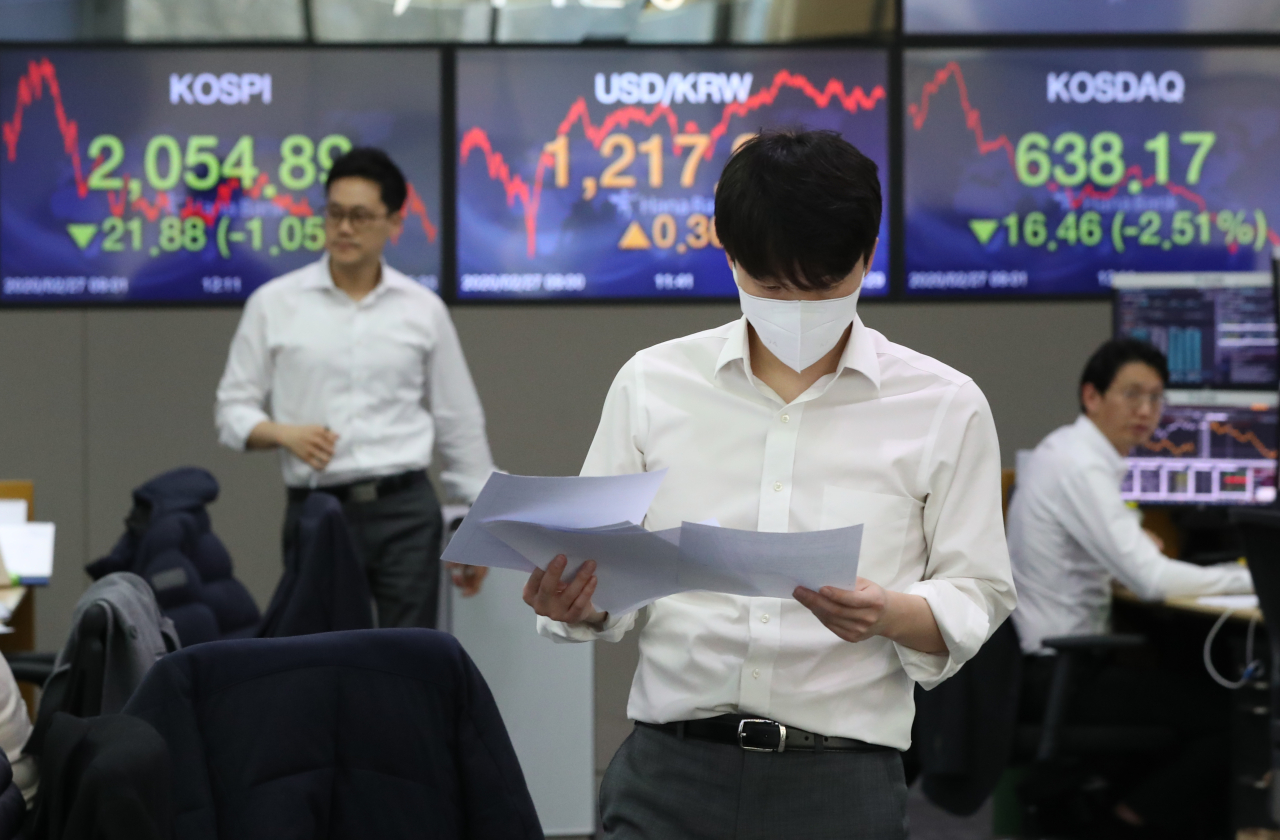
An electronic signboard at Hana Bank’s dealing room in Seoul on Thursday shows the closing prices of the nation’s benchmark Kospi and secondary tech-heavy Kosdaq indexes. (Yonhap)
South Korean stocks dipped over 1 percent Thursday after the nation’s central bank decided to keep its policy rate steady for now despite the market’s widespread anticipation of a further cut.
The benchmark Kospi opened lower at 2,073.87 -- down 2.90 points, or 0.14 percent, from the previous session. The index edged up in early morning then suddenly headed south after the Bank of Korea’s announcement. The weak trend continued throughout the day to close at 2,054.89 -- the lowest since the 2,044.61 points marked on Oct. 11 last year.
The BOK left the base rate frozen at the current 1.25 percent, despite growing calls for a rate reduction to counter the growing economic fallout from the new coronavirus outbreak. The central bank has been keeping the policy rate at the record low level since October last year.
The central bank also announced its downward revision by lowering its growth estimate for the year by 0.2 percentage point, as the fast-spreading COVID-19 virus is feared to badly hurt the economy, which was earlier expected to grow 2.3 percent this year.
Korea reported a whopping 334 new cases of the new coronavirus and one new fatality Thursday morning, bringing the total number of infections here to 1,595 with death toll of 13.
Foreign investors net sold 409.3 billion won ($337.1 million) worth of stocks, weighing down the bourse. They extended selloffs for fourth consecutive session. The total amount sold marked some 2.84 trillion won.
The tech-heavy secondary Kosdaq also fell 16.46 points, or 2.51 percent, closing at 638.17. Foreign and institutional investors dumped 97.2 billion won, 235.9 billion won of local shares, respectively.
Treasury bond interest rates were also affected by the central bank’s key rate freeze. Bond prices, which move inversely to yields, closed lower. The yield on three-year Treasurys rose 5.9 basis points to 1.194 percent and bonds with a maturity of 10 years added 4.8 basis points to 1.443 percent.
The return on the benchmark five-year government bond and one-year Treasurys rose 5.8 basis points and 3.5 basis points to 1.290 percent and 1.154 percent, respectively, at the closing bell.
Major stock market indexes closed mixed on Wall Street on Wednesday over a possible COVID-19 pandemic around the globe. The Dow Jones Industrial Average stood at 26,957.59 -- down 123.77 points, or 0.46 percent from the previous session’s close. The S&P 500 also inched down 0.38 percent , though the Nasdaq edged up 0.17 percent, the same day.
Foreign investors have been unloading the local stocks over the past month. According to the Korea Exchange, offshore investors sold a net 3.88 trillion won of Korean equities, from Feb. 3 to Thursday.
Foreigners sold a net 645.2 billion won worth of local stocks Thursday alone. They dumped 1.59 trillion won a day earlier, the largest daily sell-off since Aug. 10, 2011. Among the selling on Wednesday, they offloaded 876.1 billion won from the Kospi.
“Growing concerns over local firms’ earnings in the wake of the COVID-19 virus have weighed down overall investor sentiment. A weak Korean won against the US dollar has further attributed strong foreign selling of local stocks,” said Seo Sang-young, an analyst at Kiwoom Securities.
Market experts forecast that offshore investors are expected to enter the local stock market again when the won-dollar rate stabilizes after the government’s drafting of an extra budget to tackle the COVID-19 outbreak or a turning point appears in the fast-spread virus confirmed cases in the country.
“To see a rebound in the (local) stock market, we need some kind of ‘good news’ related to the new coronavirus, saying that there are no more confirmed cases in the country,” said Jung Yong-taek, a senior researcher at IBK Securities. “Depending on the Federal Reserve’s stance regarding the COVID-19 outbreak in March may bring back foreign investors to the Korean stock market.”
The local currency closed at 1217.20 won against the greenback -- down 0.30 won from the previous session’s close.
By Jie Ye-eun (
yeeun@heraldcorp.com)






